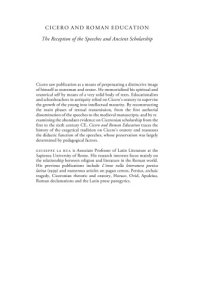"Cicero saw publication as a means of perpetuating a distinctive image of himself as statesman and orator. He memorialized his spiritual and oratorical self by means of a very solid body of texts. Educationalists and schoolteachers in antiquity relied on Cicero's oratory to supervise the growth of the young into intellectual maturity. By reconstructing the main phases of textual transmission, from the first
authorial dissemination of the speeches to the medieval manuscripts, and by re-examining the abundant evidence on Ciceronian scholarship from the first to the sixth century CE, Cicero and Roman Education traces the history of the exegetical tradition on Cicero's oratory and re-assesses the 'didactic' function of the speeches, whose preservation was largely determined by pedagogical factors"..."Cicero never died. His assassins mutilated his corpus. They cut off his head and hands to eradicate his memory and spiritual legacy. Yet Cicero's genius survived the accidents of time and stamped its mark on every age. As predicted by the Roman historian Velleius Paterculus, Cicero's intellect and eloquence transcended the fragility and perishability of the human being. Murdered by the sword of Antony's hitmen, Cicero survived the fragility of life through his writings. The poignant scene of Cicero's violent death, recreated in dramatic forms by historians, poets and talented declaimers, pays tribute to the statesman's and orator's accomplishments and immortalizes the last fighter for the liberty of the Roman republic as the 'embodiment of verbal ingenium'"...
Read more... 